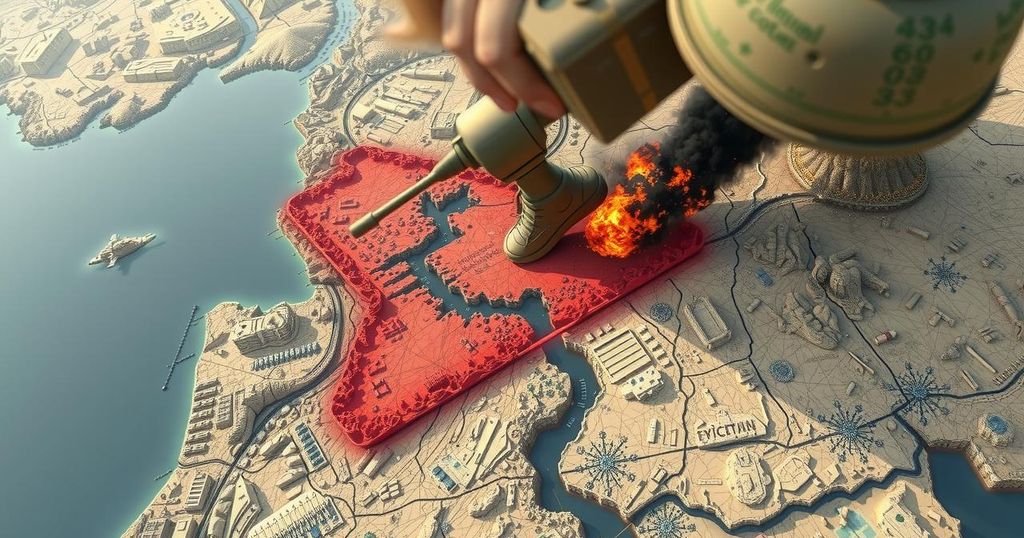Mahmoud Abbas: Reflecting on 20 Years of Leadership and Prospects for Palestinian Statehood

On the occasion of Mahmoud Abbas’s 20th year as Palestinian Authority President, his leadership highlights ongoing divisions within Palestinian politics and challenges to statehood. Despite initial optimism and international support, Abbas has faced stagnated peace talks, internal discord primarily with Hamas, and public disillusionment due to a lack of elections. Renewed international interest in the Israeli-Palestinian conflict, particularly through Saudi initiatives, could potentially reshape the future landscape for Palestinian aspirations, though significant obstacles remain.
As Palestinian Authority President Mahmoud Abbas marks two decades in office, his leadership encapsulates a narrative of both hope and despair within the Palestinian situation. From inheriting a fragmented political landscape after Yasser Arafat’s demise in 2004, Abbas has navigated internal divisions, particularly with Hamas, and has attempted to leverage international diplomacy to foster the establishment of an independent Palestinian state. Despite an optimistic start, including the support of international powers and an initial emphasis on nonviolent resistance, his presidency has faced multiple setbacks, exacerbated by stalled peace talks and rampant internal division between Fatah and Hamas.
Currently, as Saudi Arabia emerges as a mediator with the Global Alliance for the Implementation of the Two-State Solution, Abbas faces introspection as he evaluates the possibility of achieving his long-stated goal of statehood within his remaining years in office. His administration has seen incremental achievements such as Palestine’s recognition at the United Nations, yet his extended rule and the absence of democratic processes have cultivated significant disillusionment among Palestinians. The ongoing conflict, including the deadly Hamas-led attack on Israel followed by severe retaliatory actions, reflects the tumultuous reality for Palestinians and poses further hurdles to unity and peace.
Moving forward, Abbas’s legacy hinges upon whether he can revitalize efforts toward Palestinian statehood by fostering unity among factions and engaging effectively with international players. As the viability of a two-state solution remains uncertain amid mounting challenges, including Israeli opposition to concessions, Abbas’s tenure stands at a critical juncture. The diplomatic landscape is increasingly shaped by ongoing dialogues, particularly under Saudi leadership, that could either facilitate progress or highlight Abbas’s shortcomings in achieving the aspirations of the Palestinian people.
The tenure of Mahmoud Abbas as the President of the Palestinian Authority has progressed in a milieu marked by political fragmentation and recurrent clashes with the Israeli government. Following Arafat’s death, Abbas was expected to unify differing Palestinian factions and lead toward statehood, yet divisions between Fatah and Hamas have only deepened since Hamas’s seizure of Gaza in 2007. The stalled peace negotiations, lack of electoral processes, and perceived inefficacies of the Palestinian Authority have contributed to public disillusionment. Meanwhile, recent internal and external dynamics, particularly the emergence of new regional diplomatic initiatives led by Saudi Arabia, pose questions about the future viability of Palestinian statehood under Abbas’s leadership. Abbas’s efforts have coincided with a heightened international focus on the issue, reflecting an evolving geopolitical context.
Abbas’s leadership, now nearing its 20-year mark, presents a compelling but complex narrative of resilience amidst significant political and social challenges. While he has garnered international recognition for Palestine, the lack of tangible progress towards sustainable statehood raises critical questions about his governance and future prospects for the Palestinian cause. The evolving diplomatic initiatives led by Saudi Arabia underscore a potential shift in the quest for Palestinian statehood, yet the need for internal reconciliation and consistent dialogue remains paramount for any meaningful advancement.
Original Source: www.arabnews.com








